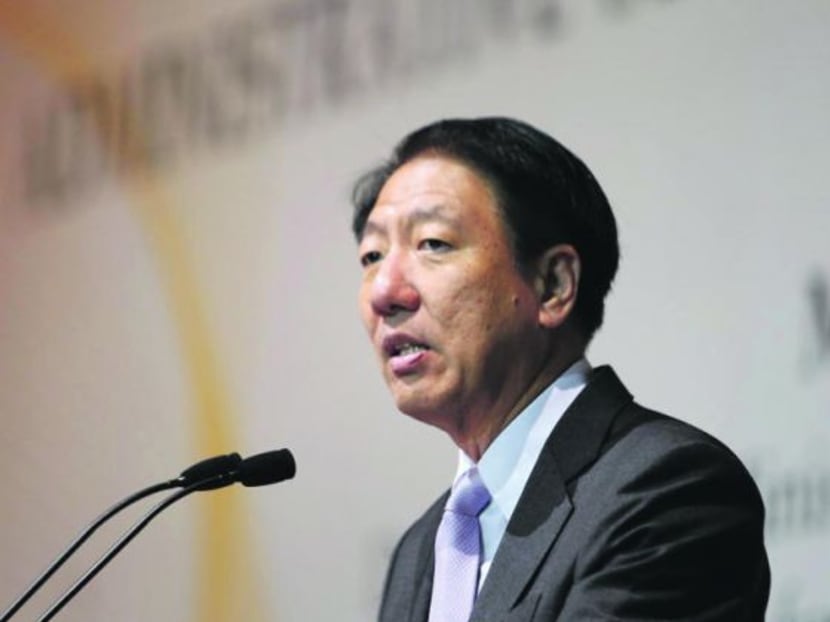Greater engagement needed to boost India-Asean ties: DPM Teo
SINGAPORE — Greater engagement and integration in the areas of regional trade agreements and digital solutions are key to strengthening the Asean-India partnership, said Deputy Prime Minister Teo Chee Hean on Sunday (Jan 7).

Deputy Prime Minister Teo Chee Hean stressed the urgency to accelerate discussions on the Regional Comprehensive Economic Partnership (RCEP) at the Pravasi Bharatiya Divas (PBD) gala dinner on Sunday (Jan 7). TODAY file photo
SINGAPORE — Greater engagement and integration in the areas of regional trade agreements and digital solutions are key to strengthening the Asean-India partnership, said Deputy Prime Minister Teo Chee Hean on Sunday (Jan 7).
Speaking at the Pravasi Bharatiya Divas (PBD) gala dinner held at Marina Bay Sands, DPM Teo also discussed among other things, expanding connectivity between Singapore and India, citing the “huge potential for further co-operation between India and Asean”.
The two-day conference, which began on Saturday, was attended by several of the Republic’s Cabinet ministers, Union ministers and Chief Ministers from India, and academics from around the region.
Mr Teo, who is also the Co-ordinating Minister for National Security, stressed the urgency to accelerate discussions on the Regional Comprehensive Economic Partnership (RCEP).
Such agreements are important to “support an open environment that is conducive to trade and investment”, he said.
Asean is India’s fourth largest trading partner, with two-way trade totalling about US$76 billion (S$102.2 billion). In his speech, Mr Teo stated that Asean-India trade accounted for only 2.6 per cent of the group’s external trade in 2016.
Negotiations for the RCEP, which began in late 2012, have taken longer than expected as some of Asean’s dialogue partners, such as India and China, do not have free-trade agreements with each other.
Mr Teo said that India and Asean can leverage “its young populations and rising consumption” to boost manufacturing, exports and growth through the RCEP, so as to reach the total trade target of US$200 billion by 2022.
Mr Teo also suggested improving maritime and air connectivity to bring India closer to the rest of Asean.
“Greater maritime connectivity with Asean would open considerable avenues and opportunities for trade,” said Mr Teo, who identified shipping and logistics services as sectors which stand to benefit as a result.
Singapore and India recently concluded a naval pact in November last year. The agreement would see Indian naval ships berthing in Singapore for an “operational turnaround”.
On expanding air connectivity, Mr Teo urged India to further liberalise its air services, citing that free flows on the “highways of the sky” can increase two-way flows of visitors, business people and trade.
Mr Teo suggested: “For a start, India could pilot one or two key metropolis to have open skies to cities in Asean, and then assess the benefits of this liberalisation to the economy before extending it to other cities.”
He also brought up the potential of collaborating in digital solutions such as cross border payment methods.
“Whether it is public initiatives such as Aadhaar — India’s national digital identification system and UPI — the United Payments Interface, or private ventures such as PayTM, there are significant opportunities for these platforms to be harmonised with those in our region,” he said.
“These will create the cyber-highways that e-commerce and e-services depend on. These initiatives will fit in well with the aim to develop an Asean Smart Cities Network to drive regional smart cities development.”
Mr Teo reiterated the Republic’s commitment to efforts to move the trade talks forward, saying: “As Asean Chair this year, Singapore will do what we can to secure the support of India and all the other RCEP countries to advance the RCEP negotiations.”
Singapore is prepared to play a practical role in these areas, added Mr Teo. “We are a good base for Indian companies to work from in order to expand to South-east Asia and beyond. Singapore can also play a role to connect the many companies from a wide range of countries who have found Singapore to be a useful operational base.”
There are currently 8,000 Indian companies in Singapore — more than double that from 2009 — pointed out Mr Teo, who attributed the growth in part to the Indian diaspora in Singapore.
“The strong, centuries-old socio-cultural links fostered by the diaspora have made it easier for Indian companies to strengthen their regional presence,” he said.
He added that all Singapore-based companies from various countries can work together to tap on Singapore’s business infrastructure, and “comprehensive network of 20 implemented Free Trade Agreements with 31 trading partners to facilitate their expansion abroad”.
India’s Prime Minister Narenda Modi is set to deliver the keynote address at the Shangri-La Dialogue held in Singapore later this year.






